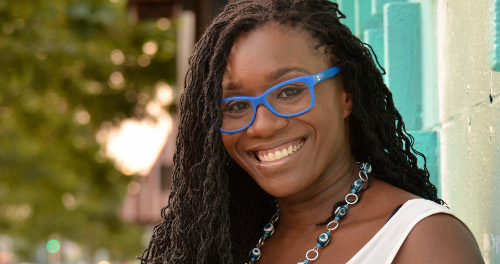
AIDS Partnership Michigans Akilah Benton. Photo by Charsha Olumba
DETROIT – As a teen, Akilah Benton volunteered with the city of Detroit Health Department. The experience of what she witnessed in the early 2000s, she says, launched her on a trajectory to address HIV and the systematic obstacles which inform, feed and encourage it.
"It was alarming for me to hear about the rates of chlamydia and gonorrhea within the city of Detroit," she says. "There was this idea of kids doing this buzz, catching this buzz, that if your friend had HIV or an STD, you were going to expose yourself and put yourself at risk to get that disease as well."
Hearing that was "alarming" for her and launched her on a career trajectory that has now landed her at AIDS Partnership Michigan as that organization's new community mobilization and public relations coordinator. It's a post the 29-year-old Detroit native appears to have been on for years.
As a child, her family opened an adult foster care home and the clients lived in the house with them. She said it was then, in about the fifth grade, that she discovered the joys of "humbling" herself in service of others. She also began to see more clearly the othering that was happening to America's hidden populations – the elderly and the disabled.
"I loved working with my family," she says. She worked with her family for a time following graduation from Wayne State University with an undergraduate degree in anthropology. Despite loving the work, she felt a need to follow her true passion.
"I had a resounding desire to step into the arena I wanted to be in, which was public health, specifically looking at health disparities as they applied to women and children," Benton says. She entered graduate school in Florida and spent time working on the epidemic in South Africa.
How HIV became a passion for her is a blurry memory.
"There was a time – I don't remember when or where it was – I learned that African Americans make up 10 to 11 percent of the world's population but over half of the incidence of HIV/AIDS. That was just alarming to me," she says. "Knowing that my sisters and brothers, my family, my friends, my community members are plagued by this epidemic more than any other racial group or demographic – that was really alarming to me and it stood out, made me want to be a part of the change."
And in her new role, Benton is planning to lead APM in becoming an even stronger agent for change in the fight against HIV in Detroit. She noted the organization's ground breaking "Status Sexy" campaign's success as an example of how she plans to combine new media and old fashioned grass roots action. The social media program started three years ago solely as a social media program – now it's the source of the largest condom distribution in the city.
To build on that success, Benton says she plans to connect with barber shops throughout the city.
"Barber shops have always been the epicenter for cultural thought and dialogue," she says. "Why not educate [barbers] about HIV and its impact on the community?"
With that education, then comes conversation Benton says will be essential in addressing the HIV crisis in Detroit. But she's under no illusion that this will be an easy conversation.
"There is still a very serious issue with stigma," she says of African Americans discussing same-sex coupling and behavior. "No one wants to have this conversation; as a result, African American MSM [men who have sex with men] are discriminated against."
She says the timing is right, however, for such discussions to happen in the community.
"I'm optimistic," she says. "I think we're moving towards equality not only for MSM, but the LGBT community as a whole."
From her observations, MSM in Detroit are facing this epidemic in large part because of other social determinants of health – those things which impact health but are not directly health related. For instance, well paying jobs, stable and safe housing, food and transportation.
"Some of these men are more concerned about these determinates of health effecting their livelihood than HIV," she notes.
And that will also play a role in scaling up access to PrEP – pre-exposure prophylaxis – as a prevention option in the community.
PrEP is a once a day pill which has been shown to be more than 90 percent effective at preventing an HIV negative person from becoming infected. But the drug is expensive and requires access to regular health care for blood work and STD screenings.
"How do we offer it without breaking people's pockets?" she asks of the quandary many states and localities find themselves in with the new intervention.
But she says the intervention is being discussed, which is important because "we know condom use is down," but that it needs to have more discussion.
At the end of the day, Benton is ready to live her favorite Maya Angelou quote:
"You may encounter many defeats, but you must not be defeated. In fact, it may be necessary to encounter the defeats, so you can know who you are, what you can rise from, how you can still come out of it."










